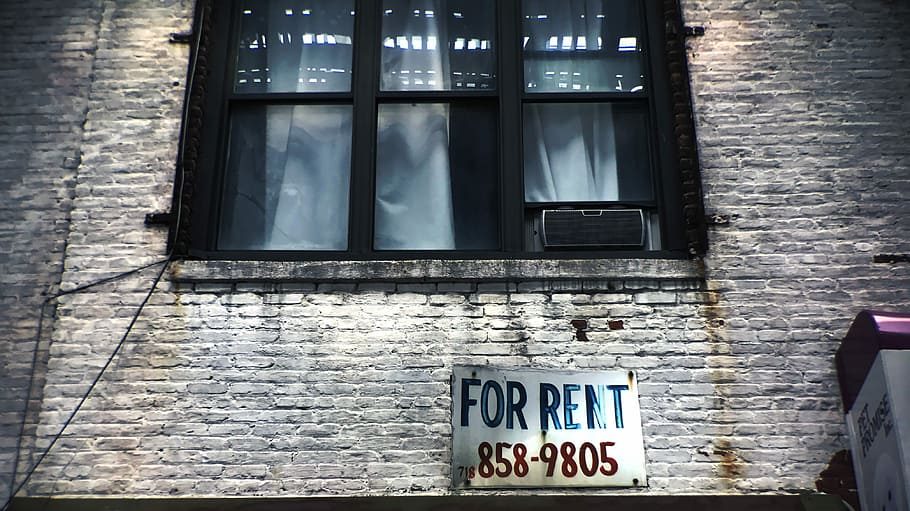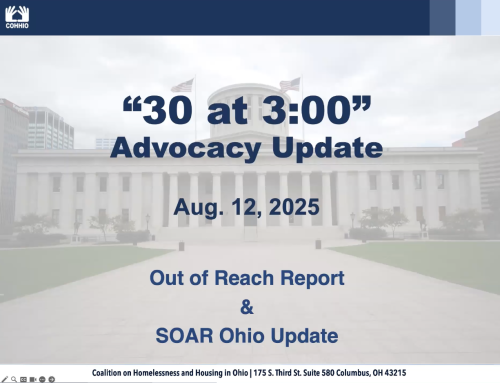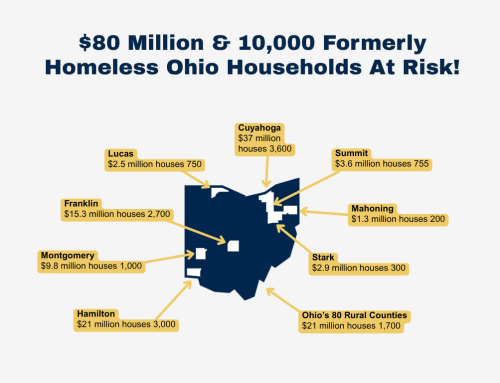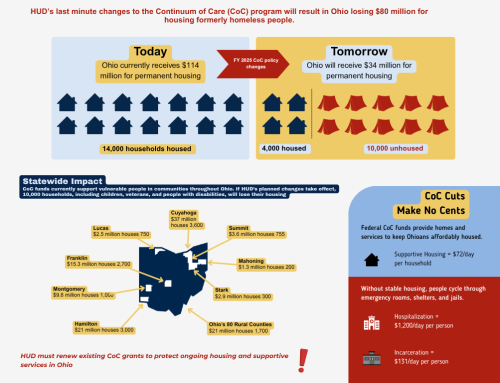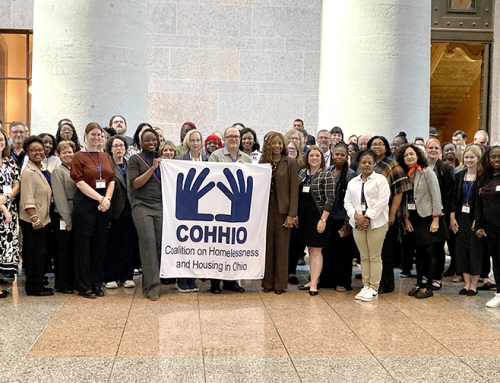Click here to watch the video news conference calling for emergency rental assistance.
News clips:
- https://radio.wosu.org/post/ohio-landlords-and-tenants-call-federal-rental-assistance-during-pandemic#stream/0
- https://abc6onyourside.com/news/local/tenants-landlords-pushing-congress-for-help-in-latest-relief-bill
- https://www.10tv.com/article/housing-advocates-push-federal-rental-assistance-2020-apr
- https://www.nbc4i.com/news/concerns-grow-over-paying-rent-during-covid-19-crisis/
- https://dayton247now.com/news/local/ohio-renters-landlords-push-for-emergency-rental-assistance-needed-during-pandemic
- https://www.daytondailynews.com/news/local/may-rent-due-landlords-fear-nonpayment-could-surge-this-month/c94bL6o3Q32zK5lzIgKwhK/
For Immediate Release
April 30, 2020
CONTACT: Marcus Roth, marcusroth@cohhio.org, 614-257-9848
Ohio Tenants and Landlords Unite Behind Emergency Rental Assistance Proposal
Advocates representing tenants and landlords joined forces Thursday to urge support for including emergency rental assistance in the next coronavirus relief package to help Ohio recover from the coronavirus pandemic.
The shutdown of the economy – and resulting mass unemployment – has fallen especially hard on Ohio’s renters. An estimated 630,000 unemployed tenants owe a combined total of $500 million each month, and many will be unable to pay their rent tomorrow on May 1.
Bill Faith, executive director of the Coalition on Homelessness and Housing in Ohio, said the pandemic has exacerbated a growing economic vulnerability that already existed in Ohio.
“Long before anyone ever heard of COVID-19, hundreds of thousands of Ohioans struggled to pay the rent each month. And now mass layoffs have made it impossible,” Faith said. “Income from unemployment compensation and one-time federal stimulus checks are helpful right now for those who receive them, but it’s not enough to cover rent, utilities, food, healthcare, car payments, and other bills in the months to come.”
COHHIO rallied organizations representing both landlords and tenants to call on Ohio’s Congressional delegation to support a $100 billion temporary rental assistance program to stabilize workers who have lost their jobs due to the coronavirus pandemic. The proposal is targeted to low-income households, based on their current economic circumstances.
Steve Gladman, president of the Affordable Housing Trust for Columbus and Franklin County, pointed out that landlords have also been hard hit as rental income falters.
“Like the renter, the owner has monthly financial obligations that must be met, including a mortgage, payroll, taxes and property maintenance,” he said. “Eviction moratoriums in many jurisdictions hit the pause button on displacing tenants, but the only thing that really paused was tenants’ income. Rent deferment is not rent forgiveness, and once the moratorium is lifted, tenants will be unable to pay the large, ballooning sum of money owed.”
Graham Bowman, staff attorney with the Ohio Poverty Law Center, said without emergency rental assistance the coronavirus shutdown could spark an eviction epidemic even worse than the foreclosure crisis of 2008.
“We fear that evictions and the homelessness that follows will continue to pose a severe health risk to the entire state. Many courts are delaying eviction hearings, but that does not relieve the responsibility to pay rent. And those eviction moratoriums will expire soon,” Bowman said. “We need emergency rental assistance to prevent a spike in evictions in the coming months. With another rent payment due tomorrow, many families are falling behind. Both renters and property owners need support.”
After the expanded unemployment insurance expires at the end of July, an unemployed Ohio household of three will face a deficit of up to $935 after paying monthly bills for rent, food and healthcare, according to COHHIO’s analysis. The Congressional Budget Office projects double-digit unemployment rates well into 2021.
John Wymer, president of Oakwood Management Company, which manages over 11,000 rental units in Ohio, said unemployed renters’ inability to pay their bills would have a domino effect on the national housing market.
“Many of our residents work in businesses that have been hit hard by the coronavirus shutdown requirements. We house thousands of hardworking families who were suddenly laid off. The one-time stimulus checks are helpful right now, but we know it’s going to take a long time before many people are fully employed and able to pay rent again,” Wymer said. “In the meantime, we still have to pay our mortgage, taxes, employees, and maintain our properties. Emergency rental assistance will help get many of Ohio’s workers through this unprecedented crisis, while stabilizing the housing industry.”
Faith said the coronavirus pandemic has illustrated the fundamental connection between housing and health.
“During normal times, people who struggle to pay the rent, move frequently, or experience homelessness suffer poor health outcomes. These days, housing insecurity is literally a life-threatening condition. We must help families remain in their own homes to survive this pandemic,” he said.
-30-
Statements on the Need for Emergency Rental Assistance
Scott R. Williams, Chief Executive Officer Ohio REALTORS
“As an industry that prides itself on helping business open its doors as well as making home happen, REALTORS are seeing, first-hand, how this pandemic has created unimaginable financial hardships for us all. Business owners and tenants alike are struggling to pay their rents and mortgages. As such, rental assistance is vitally important at this time. Ohio REALTORS urge Congress to act by including emergency federal rental assistance in their next coronavirus relief package. By doing so, Ohio’s businesses and residents will continue to have a place to call home when we finally emerge from this crisis.”
Heather L. Hall, Director of Advocacy for Advocates for Basic Legal Equality of Toledo
“Nearly 1 million Ohioans have filed new unemployment claims since mid-March 2020, and many have yet to start receiving benefits. As a result, countless households are at risk of being evicted because of the disruption in their monthly incomes – compounding Ohio’s eviction crisis. Emergency rental assistance is crucial to ensure Ohioans have stable housing to stay-at-home, protecting families’ health. Stable families will contribute to stabilizing the economy as Ohio reopens for business. Rental assistance payments and legal representation are necessary to prevent widespread homelessness and help tenants re-entering the workforce.”
Colleen M. Bain, Vice President of Supportive Housing for National Church Residences
“Including emergency rental assistance in the next Coronavirus relief bill is essential to ensuring stability for thousands of Americans. Many of our residents have been affected by the economic downtown and are having to choose between paying rent, buying essential cleaning supplies and other personal protective equipment, or obtaining food and medicine. Emergency rental assistance will promote health and safety while ensuring that low income housing providers can keep the lights on and continue providing the vital services needed.”
Dejanee Coaston, a Dayton-area renter, who lost her apartment last summer when tornadoes hit the Miami Valley on Memorial Day. She was recently ordered to self-quarantine 14 days after developing symptoms of COVID-19 and has been unable to work during that time. “Rental assistance would be a big help. I really need help and I don’t know what is going to come of all this. I have a daughter I have got to think about too.”
Jeffrey Beam, Regional VP of Real Estate Development for The Community Builders
“We adopted early on, before mandates, the idea that TCB residents won’t lose their homes because of nonpayment. We are investing in cleaning protocols and emergency programs that keep our residents and staff safe and connected, so our costs are going up at a time when seniors and families are struggling to pay for food and rent. TCB is prepared to weather major financial disruption, but as a nonprofit organization, there are limits how long we can continue without our primary source of operating income. Affordable housing communities have done a great job hunkering down to keep our nation safe from coronavirus spread. We hope they in turn can be supported with local and federal assistance until the economy recovers. We need emergency assistance to help out affordable housing residents.”
Nicholas DiNardo, Managing Attorney, Legal Aid Society of Southwest Ohio, LLC
“Prior to the COVID-19 pandemic, Ohio was already experiencing an eviction crisis. Many areas in the state were already experiencing eviction rates far above the national average and there is a serious lack of affordable housing. With COVID, working tenants are being laid off from their jobs and forced to stay at home, making paying the rent impossible for families that were previously living paycheck to paycheck. We must provide rental assistance and legal representation to these families who are facing homelessness due to no fault of their own.”
Kathryn Brod, President/CEO, Leading Age Ohio
“We believe 50% of both the 65-79 aged households and 80+ households in Ohio are moderately or severely rent-burdened – this means that before the COVID crisis individuals were making tough choices between food and medicine. The need for this federal assistance is critical for these vulnerable individuals.”
Anamaria Perales-Lang, Mid-West Director, Belle Harbour Management of Ohio
“The pandemic has resulted in many of our residents losing their jobs and therefor are now unable to pay their rent. In order to help our residents we have extended rent due dates, waived late fees, and started to accept credit cards. While stimulus checks have helped some , many of our residents do not qualify, have not received it or are still in need of more assistance. Many are in the food and beauty industries that have still not be allowed to reopen. These are hardworking members of our community that pay taxes, and given the opportunity will help revive our economy. None of this is going away any time soon. We are in this together, but we the landlord, can’t afford to carry the whole load by ourselves. Rental assistance to help subside the loss in rents will allow us to keep our communities intact through this pandemic. A solution that works for all.”
